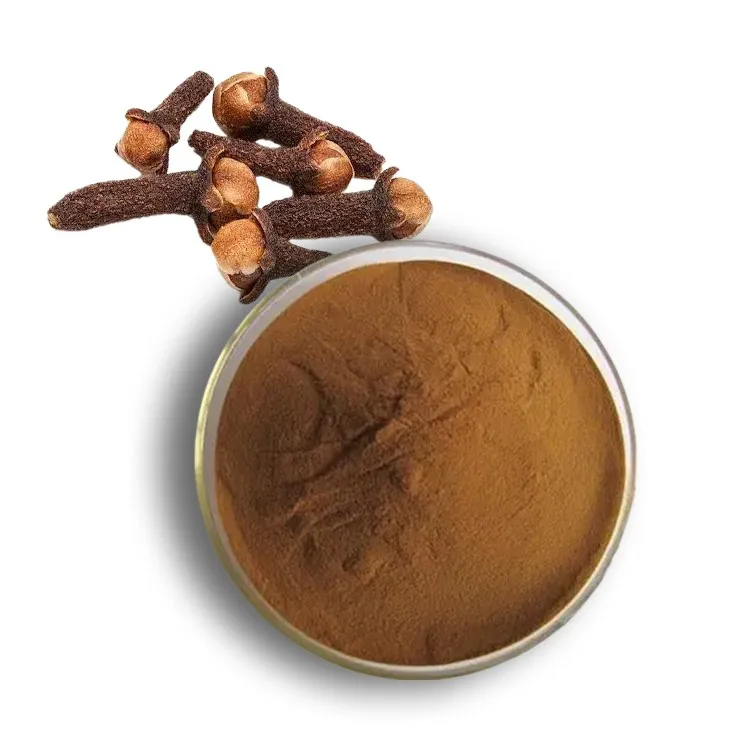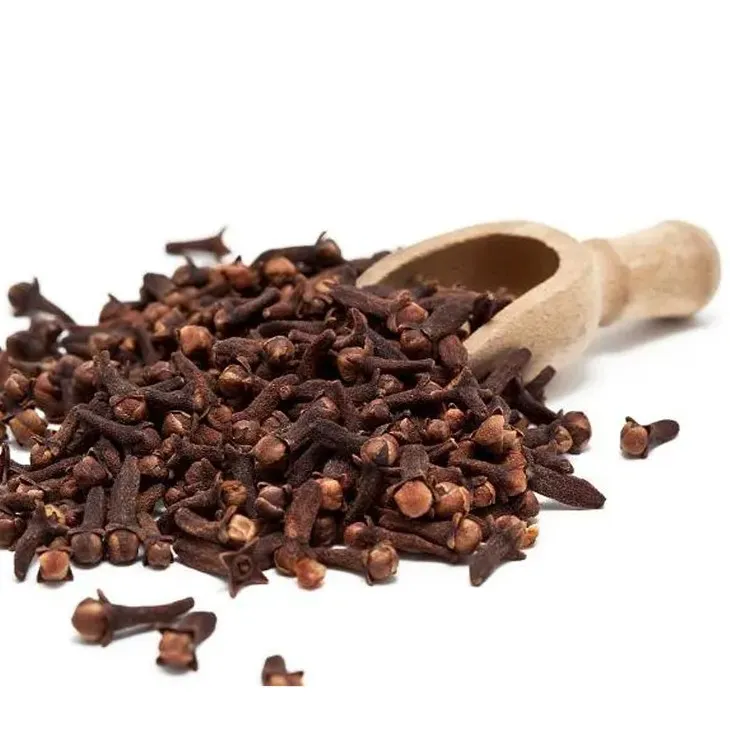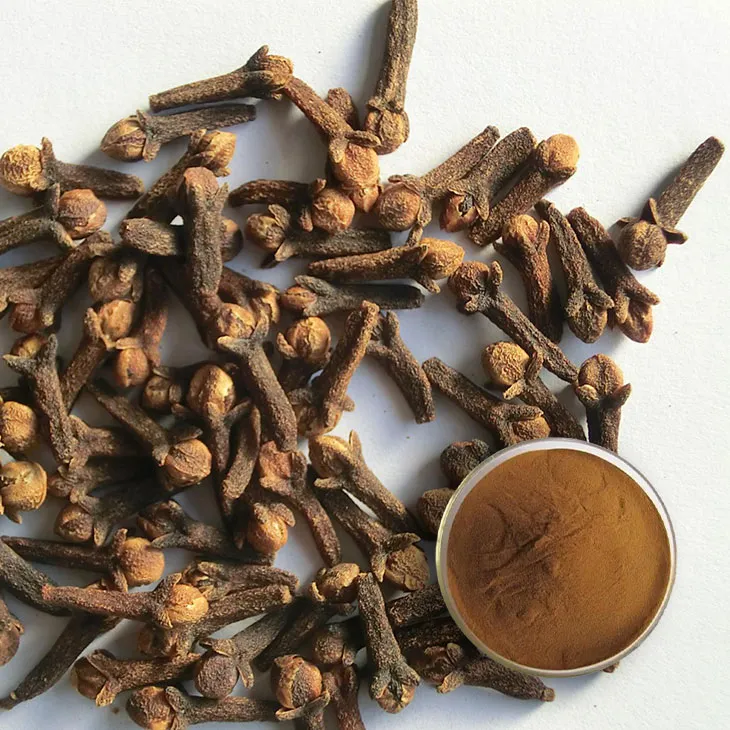- 0086-571-85302990
- sales@greenskybio.com
The Best Types of Clove Powder: A Guide to Selecting the Finest Clove Powder
2024-11-12

Introduction
Clove Powder is a versatile and aromatic spice that has been used in cooking, medicine, and perfumery for centuries. It is derived from the dried flower buds of the clove tree, Syzygium aromaticum. However, not all Clove Powders are created equal. There are various factors to consider when choosing the best type of Clove Powder. In this guide, we will explore these factors in detail to help you make an informed decision.

Origin of Clove Powder
The origin of clove powder can significantly impact its quality.
Indonesian Clove Powder
Indonesia is one of the largest producers of cloves in the world. Indonesian clove powder is known for its rich aroma and high quality. The warm and humid climate in Indonesia provides ideal conditions for clove cultivation. The cloves from this region are often carefully harvested and processed, resulting in a powder that has a strong, sweet - spicy flavor. It is a popular choice for both traditional Indonesian cuisine and international recipes.
Madagascan Clove Powder
Madagascar also produces high - quality clove powder. The cloves grown in Madagascar are often praised for their unique flavor profile. Madagascan clove powder has a slightly different aroma compared to Indonesian clove powder. It has a more floral and delicate note, which can add a subtle and sophisticated touch to dishes. This type of clove powder is also widely used in the perfume industry due to its pleasant fragrance.

Processing Methods
The way in which clove powder is processed can affect its final quality.
Traditional Sun - Drying
One of the oldest and most natural processing methods is sun - drying. Cloves are spread out in the sun until they are completely dried. This method helps to preserve the natural flavors and aromas of the cloves. Clove powder made from sun - dried cloves often has a more intense and pure flavor. However, it requires careful monitoring to ensure that the cloves are not over - dried or exposed to moisture during the drying process.
Machine - Drying
Machine - drying is a more modern and efficient method. It allows for a large - scale production of clove powder. In this process, cloves are dried using specialized drying machines. While machine - drying can be more consistent in terms of drying time and temperature control, it may sometimes result in a slightly different flavor compared to sun - dried cloves. However, modern technology has made it possible to minimize these differences, and high - quality machine - dried clove powder can still be excellent for various applications.
Grinding Process
The grinding process also plays an important role in the quality of clove powder.
- Fine Grinding: A fine - ground clove powder is more suitable for applications where a smooth texture is desired, such as in baking or making spice blends. It disperses evenly in mixtures and releases its flavors more quickly.
- Coarse Grinding: Coarse - ground clove powder, on the other hand, can be preferred for certain types of marinades or when a more rustic texture is desired. It may release its flavors more slowly during cooking, adding a long - lasting depth of flavor.

Quality Grades
Clove powder is available in different quality grades, which are determined by various factors.
High - Quality Grade
High - quality clove powder is characterized by several factors.
- Aroma: It has a strong, fresh, and characteristic clove aroma. The scent should be intense without any off - odors or signs of rancidity.
- Flavor Intensity: The flavor is full - bodied and well - balanced. It should have a proper combination of sweetness, spiciness, and warmth. High - quality clove powder can enhance the taste of a dish without overpowering it.
- Purity: It contains a high percentage of pure clove material. There should be minimal impurities such as stems, dust, or other foreign particles. Purity can be determined by visual inspection as well as by laboratory analysis in some cases.
Medium - Quality Grade
Medium - quality clove powder may have some minor drawbacks compared to the high - quality grade.
- Aroma: The aroma may be slightly less intense or have a hint of fading. It still has the characteristic clove smell but not as pronounced as the high - quality grade.
- Flavor Intensity: The flavor is present but may lack the full - bodied richness of the high - quality grade. It can still be used in cooking, especially in recipes where the clove flavor is not the dominant taste.
- Purity: There may be a small amount of impurities, but they do not significantly affect the overall quality or usability of the powder.
Low - Quality Grade
Low - quality clove powder should generally be avoided.
- Aroma: The aroma is weak or has an unpleasant smell. It may indicate that the cloves were of poor quality to begin with or that the powder has been stored improperly.
- Flavor Intensity: The flavor is diluted or has an off - taste. Using low - quality clove powder can have a negative impact on the taste of a dish.
- Purity: There may be a significant amount of impurities, which can be unappealing and may also pose a health risk in some cases.
Aroma of Clove Powder
The aroma of clove powder is one of its most important characteristics.
Freshness
A fresh clove powder has a vibrant and inviting aroma. It should smell like newly harvested cloves, with a sweet, spicy, and warm fragrance. Freshness is an indicator of the quality of the powder. Clove powder that has been stored for a long time may lose its freshness and develop a stale or musty smell.
Complexity
The aroma of high - quality clove powder is complex. It is not just a simple spicy smell but a combination of various fragrant compounds. There are floral notes, hints of eugenol (the main chemical component of cloves), and a warm, earthy undertone. This complexity adds depth to the flavor of dishes and makes the clove powder more versatile in different culinary applications.
Flavor Intensity
Flavor intensity is another crucial factor when evaluating clove powder.
Balanced Flavor
The best clove powder has a balanced flavor. It should not be overly sweet or too spicy. A balanced flavor means that the different taste components of the clove, such as the sweetness, spiciness, and the underlying warmth, work together harmoniously. This allows the clove powder to enhance the overall flavor of a dish without dominating it. For example, in a spiced cake, a well - balanced clove powder will add a pleasant hint of spice without making the cake taste too "hot".
Long - lasting Flavor
Good clove powder should also have a long - lasting flavor. When used in cooking, its flavor should be detectable throughout the cooking process and remain in the finished dish. This is especially important in slow - cooked dishes or in marinades where the clove powder has time to infuse its flavor into the ingredients.
Purity of Clove Powder
Purity is essential for ensuring the quality and safety of clove powder.
Visual Inspection
One of the simplest ways to assess the purity of clove powder is through visual inspection. High - quality clove powder should have a uniform color and texture. There should be no visible foreign particles such as dirt, stems, or other debris. If the powder has a speckled or uneven appearance, it may indicate the presence of impurities.
Laboratory Analysis
In some cases, laboratory analysis may be required to determine the exact purity of clove powder. This can detect the presence of contaminants, pesticides, or other substances that may be harmful. For commercial or high - volume use, laboratory testing is often recommended to ensure compliance with safety and quality standards.
Storing Clove Powder
Proper storage is crucial for maintaining the quality of clove powder.
Container
Clove powder should be stored in an airtight container. This helps to prevent the absorption of moisture and the loss of aroma. Glass jars or high - quality plastic containers with tight - fitting lids are ideal for storing clove powder.
Location
Store the container in a cool, dry place away from direct sunlight. Heat and moisture can cause the clove powder to deteriorate quickly. A pantry or a spice cabinet is a good location for storing clove powder. Avoid storing it near sources of heat such as the stove or oven.
Shelf Life
When stored properly, clove powder can last for up to a year. However, its quality may start to decline after six months. It is best to use it within this time frame to ensure the best flavor and aroma.
Conclusion
Selecting the best type of clove powder requires considering various factors such as origin, processing methods, quality grades, aroma, flavor intensity, and purity. By understanding these aspects, you can choose a high - quality clove powder that will enhance the flavor of your dishes, whether in cooking, baking, or in the creation of spice blends. Additionally, proper storage of the clove powder is essential to maintain its quality over time. With this guide, you are now well - equipped to make an informed decision when purchasing clove powder.
FAQ:
Question 1: What are the main origins of high - quality clove powder?
High - quality clove powder often comes from regions with ideal growing conditions for cloves. Madagascar, Indonesia, and Sri Lanka are well - known origins. In Madagascar, the climate and soil contribute to cloves with rich aroma. Indonesian cloves are also highly regarded for their unique flavor profile. The cloves from Sri Lanka are known for their purity. These regions' natural environment, including sunlight, rainfall, and soil composition, plays a vital role in the growth of high - quality cloves, which are then processed into excellent clove powder.
Question 2: How does the processing method affect the quality of clove powder?
The processing method significantly impacts the quality of clove powder. Firstly, proper drying is crucial. If the cloves are not dried correctly, it can lead to mold growth or a loss of flavor. For example, sun - drying should be done in a clean and well - ventilated area to ensure the cloves retain their natural properties. Grinding also matters. Fine grinding can result in a more consistent powder, which is better for evenly distributing the flavor. Moreover, some processing methods may involve additional steps like sorting to remove impurities, which directly improves the purity of the final clove powder.
Question 3: What is the relationship between aroma and the quality of clove powder?
The aroma is a key indicator of the quality of clove powder. High - quality clove powder should have a strong, rich, and characteristic aroma. The aroma comes from the essential oils present in the cloves. A more intense and pleasant aroma usually means a higher concentration of these essential oils, which in turn indicates better - quality cloves were used in the production of the powder. If the clove powder has a weak or off - putting aroma, it may be a sign of low - quality cloves or improper processing.
Question 4: How can one determine the purity of clove powder?
There are several ways to determine the purity of clove powder. Visual inspection can be a start. Pure clove powder should have a uniform color and texture without visible impurities such as dirt or other foreign particles. Another method is through smelling and tasting. Pure clove powder has a distinct, unadulterated flavor and aroma. Laboratory tests can also be conducted to check for the presence of additives or contaminants. For example, tests can detect if there are any artificial flavorings or pesticides, which should not be present in pure clove powder.
Question 5: What are the different quality grades of clove powder?
Clove powder can generally be divided into different quality grades based on factors such as the quality of the raw cloves, processing methods, and purity. Higher - grade clove powder is made from top - quality cloves with a high concentration of essential oils, is processed carefully to preserve its flavor and aroma, and has a high level of purity. Lower - grade clove powder may have less - than - ideal raw materials, may not be processed as precisely, and could potentially contain more impurities. The grading system helps consumers choose the appropriate type of clove powder according to their needs and budget.
Related literature
- The Influence of Origin on the Quality of Clove Products"
- "Processing Techniques for High - Quality Clove Powder"
- "Aroma and Flavor Analysis in Clove Powder"
- "Purity Standards for Clove - Based Products"
- ▶ Hesperidin
- ▶ Citrus Bioflavonoids
- ▶ Plant Extract
- ▶ lycopene
- ▶ Diosmin
- ▶ Grape seed extract
- ▶ Sea buckthorn Juice Powder
- ▶ Fruit Juice Powder
- ▶ Hops Extract
- ▶ Artichoke Extract
- ▶ Mushroom extract
- ▶ Astaxanthin
- ▶ Green Tea Extract
- ▶ Curcumin
- ▶ Horse Chestnut Extract
- ▶ Other Product
- ▶ Boswellia Serrata Extract
- ▶ Resveratrol
- ▶ Marigold Extract
- ▶ Grape Leaf Extract
- ▶ New Product
- ▶ Aminolevulinic acid
- ▶ Cranberry Extract
- ▶ Red Yeast Rice
- ▶ Red Wine Extract
-
Nettle leaf extract
2024-11-12
-
Scutellaria Extract
2024-11-12
-
Phellodendron Extract
2024-11-12
-
Golden Seal Extract
2024-11-12
-
Horse Chestnut Extract
2024-11-12
-
Marigold Extract
2024-11-12
-
Grape Leaf Extract
2024-11-12
-
Passionflower Extract
2024-11-12
-
Baicalin
2024-11-12
-
Bamboo Leaf extract
2024-11-12





















